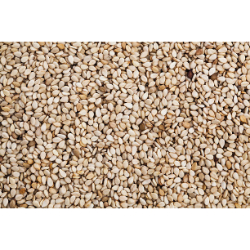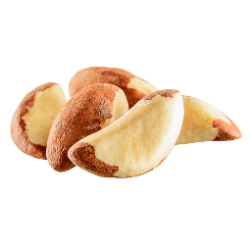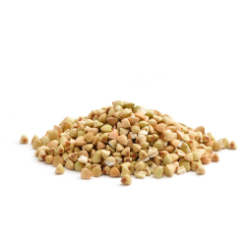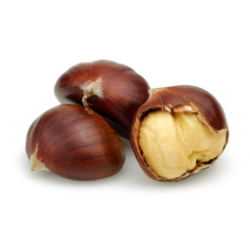Sesame seeds Nutrition facts
Sesame seeds

One of the first oil seeds known to humankind, sesame seeds have been widely employed in culinary as well as in traditional medicines for their nutritive, preventive, and curative properties. Sesame is a primary source of phytonutrients such as omega-6 fatty acids, flavonoid phenolic anti-oxidants, vitamins, and dietary fiber with potential anti-cancer as well as health-promoting properties.
Sesame plant is a tall annual herb in the Pedaliaceae family, which grows extensively in Asia, particularly in Burma, China, and India. It is also one of the chief commercial crops in Nigeria, Sudan, and Ethiopia. Scientific name: Sesamum indicum.
Sesame plant requires well-drained sandy soil and a tropical environment to flourish. It grows about 5 feet in height and bears plenty of pink-white foxglove-like flowers. The pods appear soon containing white, brown, or black seeds depending upon the cultivar type, arranged in vertical rows inside thin sacs. Each pod (2-5 cm in length) is a long rectangular box like a capsule with deep grooves on its sides. Each pod (1 to 2 inches in length) may contain up to 100 or more seeds.
Sesame seeds are small, almost oblate in shape. Toasted sesame features a pleasant, nutty flavor.
Similar Food
-
 Almonds 579 Cal
Almonds 579 Cal -
 Brazil nuts 659 Cal
Brazil nuts 659 Cal -
 Buckwheat 343 Cal
Buckwheat 343 Cal -
 Cashew nut 553 Cal
Cashew nut 553 Cal -
 Chestnuts 213 Cal
Chestnuts 213 Cal
Source of Calorie
-
Carbs23.45 g 15%
-
Protein17.73 g 12%
-
Fat49.67 g 73%
How long to burn off 573 Calories?
*Approximate base minutes for a 25-year-old, 65 kg adult at moderate intensity.
| Nutrition Principle | Nutrition Value | Percentage of RDA |
|---|---|---|
| Principle | ||
| Energy | 573 Kcal | 29% |
| Carbohydrates | 23.45 g | 18% |
| Protein | 17.73 g | 32% |
| Total Fat | 49.67 g | 166% |
| Cholesterol | 0 mg | 0% |
| Dietary Fiber | 11.8 g | 31% |
| Vitamins | ||
| Folates | 97 µg | 25% |
| Niacin | 4.515 mg | 28% |
| Pantothenic acid | 0.050 mg | 1% |
| Pyridoxine | 0.790 mg | 61% |
| Riboflavin | 0.247 mg | 19% |
| Thiamin | 0.791 mg | 66% |
| Vitamin A | 9 IU | <1% |
| Vitamin E | 0.25 mg | 2% |
| Electrolytes | ||
| Sodium | 11 mg | 1% |
| Potassium | 468 mg | 10% |
| Minerals | ||
| Calcium | 975 mg | 98% |
| Copper | 4.082 mg | 453% |
| Iron | 14.55 mg | 182% |
| Magnesium | 351 mg | 88% |
| Manganese | 2.460 mg | 107% |
| Phosphorus | 629 mg | 90% |
| Selenium | 34.4 µg | 62.5% |
| Zinc | 7.75 mg | 70% |
| Phyto-nutrients | ||
| Carotene-ß | 5 µg | -- |
| Crypto-xanthin-ß | 0 µg | -- |
| Lutein-zeaxanthin | 0 µg | -- |